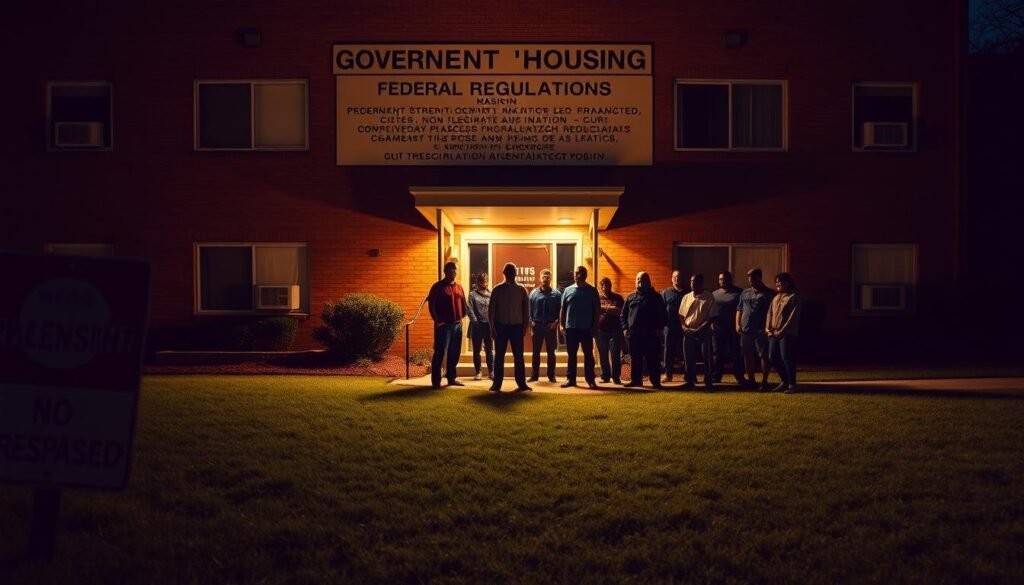Last updated on September 28th, 2025 at 11:27 am
Can Felons Live in Government Housing in Texas?? If you live in Texas and have a felony, you might wonder about government housing. The rules for getting into government housing can be complex. They change based on different factors.
It’s important to know these rules to see if you qualify. In Texas, people with felonies might find it hard to get into government housing. But, having a felony doesn’t mean you’re automatically out.
To figure out if you can get government housing, you need to look at the specific rules. You should also understand the application process. This will help you know if you have a good chance of getting housing.
Contents
- 1 Understanding Government Housing in Texas
- 2 Federal Laws on Felons in Public Housing
- 3 Texas-Specific Housing Regulations for Felons
- 4 Can Felons Live in Government Housing in Texas?
- 5 Types of Felony Convictions That Affect Housing Eligibility
- 6 The Application Process for Felons
- 7 How Family Members of Felons Are Affected
- 8 Appealing a Housing Denial in Texas
- 9 Alternative Housing Options for Felons in Texas
- 10 Rehabilitation and Its Impact on Housing Eligibility
- 11 Conclusion: Felons Live in Government Housing
- 12 FAQ
- 12.1 Can I apply for government housing in Texas if I have a felony conviction?
- 12.2 How do different types of felony convictions affect my eligibility for government housing in Texas?
- 12.3 What is the role of rehabilitation in determining my eligibility for government housing?
- 12.4 Can my family members live with me in government housing if I have a felony conviction?
- 12.5 What are the steps I need to take to appeal a denial of government housing in Texas?
- 12.6 Are there alternative housing options available to me in Texas if I’m denied government housing due to a felony conviction?
- 12.7 How do federal laws impact my eligibility for public housing with a felony conviction?
- 12.8 What documentation do I need to provide during the application process for government housing as a felon?
- 12.9 Can I still qualify for government housing if I’ve completed my sentence and parole?
Understanding Government Housing in Texas
It’s important to know about government housing in Texas if you need help. Texas has programs for low-income families, the elderly, and people with disabilities. These programs offer affordable housing.
Many groups watch over these programs. The Texas Department of Housing and Community Affairs and local housing authorities are in charge. You can find rental help, public housing, and community land trusts.
The public housing rules in Texas have rules for who can apply. You need to pass income checks and background checks to qualify. [Felons Live in Government Housing]
| Type of Housing | Description | Eligibility Criteria |
|---|---|---|
| Rental Assistance Programs | Financial assistance for rent | Income limits, family size |
| Public Housing Units | Subsidized housing units | Income limits, background checks |
| Community Land Trusts | Affordable housing through community-managed land | Income limits, residency requirements |
Learning about texas housing regulations and the housing options can help. It makes it easier to find the help you need.
Federal Laws on Felons in Public Housing
Federal rules are key in deciding if felons can get public housing. The Department of Housing and Urban Development (HUD) makes these rules. They aim to ensure safe housing while respecting the rights of those with felony convictions.
Impact of Federal Laws on Housing Eligibility for Felons
These laws affect felons in many ways. Here are some important points:
- Federal law lets housing authorities turn down people with certain felony convictions. This includes crimes like violence or drug trafficking.
- The One Strike policy lets housing authorities kick out or deny housing to people with certain criminal records. [Felons Live in Government Housing]
- There are also rules for looking at special circumstances. This allows for a more detailed check on eligibility.

How these laws are applied can change a lot. It depends on the housing program and the local housing authority’s policies. For example, some programs might be stricter or more flexible. [Felons Live in Government Housing]
Felons looking for public housing need to know the federal laws and rules. This knowledge helps them prepare better for their applications. It also increases their chances of getting the housing help they need.
Texas-Specific Housing Regulations for Felons
Felons in Texas face unique challenges when applying for government housing. The Lone Star State has its own laws about who can get public housing. These laws often mix with federal rules.
Texas law lets housing authorities look at an applicant’s criminal history. A felony can make it hard to get government housing. But, Texas looks at each case differently. They consider the crime and how long ago it happened.
When deciding, Texas looks at the type of felony, when it happened, and if there’s been more crime. Violent or drug crimes get extra attention. It’s key for applicants to know these rules to do well in the application.
To boost their chances, felons should be ready with all the details about their crime and any efforts to change. This includes court records, proof of rehab, and letters of support. [Felons Live in Government Housing]
In short, Texas’s housing rules for felons are tough. But, knowing these laws and being ready with the right documents can help. By understanding state laws on felons and texas housing regulations, people can improve their chances of getting approved.
Can Felons Live in Government Housing in Texas?
To find out if felons can live in government housing in Texas, we must look at both federal and state rules. It’s important to know that getting into government housing depends on many things. These include the type of felony, how long ago it happened, and any efforts to change your ways.
In Texas, government housing follows federal rules. These rules often keep out people with certain felony convictions. For example, crimes like drug trafficking or violence can make it hard to get housing.
But, not every felony conviction means you can’t get government housing. The details of your case and how you’ve acted since then matter. If you’ve done a rehab program or stayed crime-free for a while, you might still qualify.

Here are some key things that affect if felons can get government housing in Texas:
- The type and severity of the felony conviction
- The time elapsed since the conviction
- Any rehabilitation or crime-free periods
- Your current financial situation and income level
It’s also important to know that Texas has its own rules on top of federal ones. Some local places might have stricter rules or be more lenient for certain crimes.
To increase your chances of getting government housing, consider these steps:
- Gather all needed documents, like proof of rehab and being crime-free.
- Talk to local housing authorities to learn their specific rules and policies.
- Look for help from groups that focus on helping felons get back into society.
By following these tips, you can better understand the rules for government housing in Texas as a felon. [Felons Live in Government Housing]
Types of Felony Convictions That Affect Housing Eligibility
Different types of felony convictions have different effects on getting government housing in Texas. It’s important to know these differences to understand housing rules.
Felony convictions for drug-related crimes or violent offenses get more attention from housing authorities. For example, crimes like making or selling drugs can lead to harsher penalties. This might mean you can’t get government housing for a longer time.

But, some felony convictions might not affect housing as much. This is true if the crime is not violent or if there are special reasons. For instance, some white-collar crimes might not be as severe. This depends on the details of the case and how long ago it happened.
Factors Influencing Eligibility
- The nature and severity of the felony conviction
- The time elapsed since the conviction
- Evidence of rehabilitation or good conduct
Knowing these factors helps people with felony convictions figure out if they can get government housing in Texas. [Felons Live in Government Housing]
The Application Process for Felons
To apply for government housing, felons must know the steps and what documents are needed. First, you’ll check if you’re eligible based on your felony and other factors.
You’ll need to collect important documents. These include ID, proof of income, and court records from your conviction.It’s crucial to be detailed and correct with these documents, as mistakes can slow down your application.
Then, you’ll fill out a housing application form. You can find this online or get it in person. Make sure to share all the details about your conviction and any related situations.
After you submit your application, the housing authority will review it. This might include a background check and checking if you meet their eligibility rules.
Knowing the application process well and being ready can help you get government housing. [Felons Live in Government Housing]
How Family Members of Felons Are Affected
Felony convictions affect more than just the person who committed the crime. They can also impact the housing eligibility of family members. If a family member has a felony, it can affect the whole household’s chance to get government housing.
So, how does this happen? When you apply for government housing, they look at everyone’s criminal history. This means even if you don’t have a felony, your family’s chances can still be hurt if someone in the house does.
The effect on family members depends on several things. These include the type of felony, the housing program’s rules, and if the felon lives with you. For example, if a parent with a felony lives with their kids, it might affect their housing chances differently than if the felon was an adult child.
| Factor | Impact on Housing Eligibility |
|---|---|
| Type of Felony Conviction | Different types of felonies may have different impacts on eligibility. [Felons Live in Government Housing] |
| Housing Program Rules | Each housing program has its own set of rules regarding felony convictions. |
| Household Member Status | Whether the felon is a required member of the household can influence eligibility. [Felons Live in Government Housing] |
It’s key for families to understand these details when applying for government housing. Some programs are more lenient than others. There might also be other housing options for families with a felony conviction.
In short, a family member’s felony can greatly affect their housing chances. Knowing about these rules and options can help families make better choices about where to live. [Felons Live in Government Housing]
Appealing a Housing Denial in Texas
If your application for government housing in Texas is denied, you can appeal. This is true even if you have a felony record. Appealing is a key step to show your side of the story and possibly change the initial decision.
To start an appeal, first find out why you were denied. Typically, the reasons are in the denial letter. Common reasons include your income, credit score, and criminal history. If you think the denial was unfair or wrong, you can appeal.
To appeal, write a formal request to the housing authority that denied you. Include any documents that support your case. This could be proof of income, references, or proof of trying to change.
Here is a simplified overview of the appeal process in a tabular form:
| Step | Description | Timeline |
|---|---|---|
| 1. Review Denial Letter | Understand the reasons for denial | Within 10 days of receiving the letter |
| 2. Prepare Appeal | Gather supporting documents | Within 14 days of understanding the denial reasons |
| 3. Submit Appeal | Send the formal appeal request | Within 30 days of receiving the denial letter |
Getting help from a housing counselor or legal aid can be smart. They can help make sure your appeal is good and on time.
Knowing the appeal process and making a strong case can help you win your appeal in Texas. [Felons Live in Government Housing]
Alternative Housing Options for Felons in Texas
For those with felony convictions in Texas, finding housing can be tough. When government housing is out of reach, looking at other options is key.
Here are some housing alternatives you might consider:
- Private rentals with lenient landlords
- Shared housing or roommate situations
- Non-profit organizations offering housing assistance
- Community-based housing programs
In Texas, some groups and programs help felons find homes. These options can give you a second chance and help you start over.
| Housing Option | Description | Eligibility |
|---|---|---|
| Private Rentals | Renting from landlords who are willing to overlook felony convictions | Variable, depends on landlord |
| Shared Housing | Living with roommates or in shared accommodations | Open to individuals with felony convictions |
| Non-Profit Housing | Housing provided by organizations that assist felons | Typically requires application and approval |
Looking into these housing options can really help you find a place to live in Texas. [Felons Live in Government Housing]
Rehabilitation and Its Impact on Housing Eligibility
Rehabilitation efforts can greatly change how you’re seen for government housing. By joining rehabilitation programs, you show you’re serious about changing your life. This can really help your chances for housing.
Rehab programs aim to help people move past their past and become active community members. By joining these programs, you prove to housing officials that you’re working to change and fit back in.
Some important parts of rehabilitation that affect housing eligibility include:
- Completing counseling or therapy programs
- Participating in job training or education
- Maintaining a clean record after conviction
By focusing on rehabilitation, you can boost your chances for government housing. Housing officials look at your rehabilitation efforts when deciding if you’re eligible. [Felons Live in Government Housing]
It’s crucial to keep records of your rehabilitation program involvement. Also, show proof of your progress when applying for government housing. This shows your dedication to rehabilitation and can help your housing chances.
See Also: Can a Felon Become a Garbage Man?
Conclusion: Felons Live in Government Housing
You now know a lot about government housing rules for felons in Texas. The state and federal laws decide if a felon can live in government housing.
When you apply for government housing, the type of felony matters. Some crimes, like sex offenses or violent crimes, can affect your eligibility. [Felons Live in Government Housing]
Rehabilitation can help your chances. If you’re not eligible for government housing, you might find other options like privately owned subsidized housing.
It’s important to understand the application process and how it might affect your family. If you’re denied, you can appeal. Knowing the appeal process is key.
Getting government housing as a felon in Texas is complex. But, with the right info, you can handle it. Felons in Texas should know their options and the rules. [Felons Live in Government Housing]
FAQ
Can I apply for government housing in Texas if I have a felony conviction?
Yes, you can apply. But, your eligibility depends on the felony type, how long ago it happened, and other laws.
How do different types of felony convictions affect my eligibility for government housing in Texas?
Felony types like violence or drug crimes can limit your eligibility more than others. It varies.
What is the role of rehabilitation in determining my eligibility for government housing?
Showing you’ve rehabilitated can help. It shows you’re trying to fit back into society and might lower risks.
Can my family members live with me in government housing if I have a felony conviction?
Your family’s eligibility might be affected by your felony. But, they could still get housing even if you can’t. [Felons Live in Government Housing]
What are the steps I need to take to appeal a denial of government housing in Texas?
To appeal, follow the housing authority’s process. This usually means submitting more info or asking for a hearing.
Are there alternative housing options available to me in Texas if I’m denied government housing due to a felony conviction?
Yes, there are other options. You might find private rentals, non-profit housing, or community resources. [Felons Live in Government Housing]
How do federal laws impact my eligibility for public housing with a felony conviction?
Federal laws set some rules for felons. But, states and local areas can make exceptions, affecting your housing eligibility.
What documentation do I need to provide during the application process for government housing as a felon?
You’ll need to show your felony details, any rehabilitation, and personal and financial info. [Felons Live in Government Housing]
Can I still qualify for government housing if I’ve completed my sentence and parole?
Finishing your sentence is good. But, your eligibility also depends on your felony type and current situation.

Van Maldonado, born in California, holds a degree in Criminology and Police Science. Currently serving as an investigative officer at a local police station, he spends his leisure time writing insightful content for FelonScope.com.

